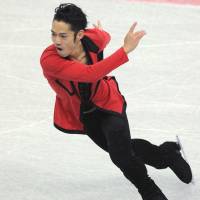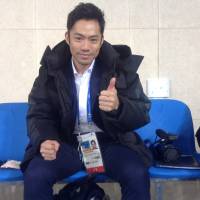One of the great aspects of covering skating in Japan is you never know what is going to happen next.
That was certainly the case on Sunday when the bombshell news dropped that former world champion and Olympic bronze medalist Daisuke Takahashi was returning to competitive skating at the age of 32.
Talk about unexpected. I don't think anybody could have foreseen this.
I certainly didn't. But here we are.
Any great athlete who retires will tell you there is never anything in their life afterward that equals being in the battle of competition. There is no doubt that this is one of the prime reasons Takahashi is returning.
Ice Time remembers seeing Takahashi at practice several times at the Pyeongchang Olympics, where he worked as a TV commentator, and thinking that he must be feeling left out in a way.
Just four years earlier he had been competing at the Sochi Games in his third Olympics.
Takahashi, a native of Okayama Prefecture, may have well earned a second Olympic medal in Sochi to go with the one he has from Vancouver if had not been dealing with a knee injury.
He still finished sixth after telling Ice Time at a news conference "that my leg is not 100 percent."
Through the years, many famous athletes have attempted to come back after extended time away.
Some have done well (Michael Jordan, Mario Lemieux), while others have not (Bjorn Borg, Michael Schumacher).
But what is admirable is that they all took the chance to risk their reputations again for the love of their sport. They all had guts, which is what helped make them great in the first place.
The most likely comparison in skating to Takahashi would probably be that of Midori Ito, the 1989 world champion and 1992 Olympic silver medalist. Ito retired after the Albertville Games and sat out three full seasons, before briefly returning during the 1995-96 season at the age of 26.
Ito added a ninth Japan title to her resume and went on to finish seventh at the worlds that season, but clearly did not appear enthusiastic about competing again. The word around skating circles was that she had been pressured by various parties to return and try to participate in the 1998 Nagano Olympics. It didn't work out that way in the end.
The difference between Takahashi and Ito is that Takahashi is willingly returning, saying that he needs skating in his life.
"I realized during the four years that the fact that I couldn't compete at the world championships after the Sochi Olympics, because of an injury, was also something that prevented me from moving on entirely to the next step," Takashi said at a news conference in Tokyo on Sunday night, according to the website fstranslations.tumblr.com.
Takahashi, who will be coached again by Utako Nagamitsu, is going to start from scratch, beginning with the Kinki regionals in October and going on to the West Japan sectionals, in hopes of competing at the Japan nationals in Osaka in December.
"I want to be in the last group at nationals and be with them during six-minute practice and official practice," Takahashi said on Sunday.
This is the kind of statement that Ice Time loves to read. Takahashi was not just a great technical and artistic skater, but had incredible passion. That is what resonated with his legion of fans around the globe.
That is not an exaggeration. Just the mention of his name still gets skating fans talking about his ability to connect with the audience.
Takahashi is smartly setting modest goals at the outset of his comeback, but you better believe they will increase exponentially if he hits his stride. When you have known the glory he has, you don't return from a four-year retirement to be an also ran.
Coaches provide insight
Ice Time reached out to a couple of veteran coaches to get their thoughts on Takahashi's comeback.
"Oh my god. How old is he now?" commented a foreign coach, who requested anonymity, when I informed them of the news that Takahashi was coming back.
"Wow. One of the most exciting skaters for sure," the coach added. "Daisuke is a phenomenal performer. Great skater, dramatic, powerful, emotional."
The coach then asked a legitimate question.
"But can the body handle the necessary number of quads?" the coach said.
"If he is coming back, he's probably already done enough training to know what he can do and how he can gain the points. He may have done the math already. Then he might have taken a look at the field and said, 'Who's left?' the coach commented.
"The great thing about the current system is that you can do the math on it, and you can study your competitors, and you say, 'Can I be competitive?' " the coach noted. "I'm pretty sure Daisuke has done his homework."
The coach acknowledged that Takahashi's return was a positive development for the sport.
"At the age of 32 — that's quite something," the coach stated. "That will be amazing. It's great for skating. I think it is a good thing."
The coach then detailed how difficult it is to walk away from being an elite skater and transition into something else that is as fulfilling.
"The reality is this, and any skater at that level will tell you this: competitive skating at that level is a drug like any drug," the coach commented. "It is not an illegal drug. To have spent your life, and the time and the effort and the energy, and the adrenaline that you have every day, the highs and lows, is the drug of life.
"When you don't have that in your life or you can't replace it in your life, you might go back to what you know best," the coach continued. "(Patrick) Chan did, (Carolina) Kostner did, (Evgeni) Plushenko did. There are so many.
"You get tired of it, and you get exhausted and you think, 'OK. It's done.' But when you think it's done, there is something empty in your life. I completely understand it. It's going to be an interesting year. I'm thrilled he is coming back."
Ice Time also spoke with a veteran Japanese coach to see what they thought.
"That's unbelievably great. I was shocked to hear it," the coach, who asked that their name not be used, said. "I'm guessing he will get the spot at the NHK Trophy."
I asked the coach what they thought the prospects for Takahashi being competitive were.
"I'm not expecting him to reach the very top and compete with Yuzu and Shoma, but I think he can be a very good role model to show how to skate. That is important," the coach explained.
"The new rules could benefit him, especially the limit on jumps in the second half of the program. This could make it better for him," the coach added.
Junior skater Moa Iwano, who is also coached by Nagamitsu and will train with Takahashi at the Kansai University rink, is looking forward to learning from the legend.
"I was very surprised when I heard the news of Daisuke," Iwano wrote in an email to Ice Time on Monday. "I am very happy. I am very pleased that his performance will be seen again.
"From now I will practice with Daisuke. I would like to learn a lot about his good points," added Iwano.
No matter how it turns out, Takahashi deserves the respect of the entire global skating community for putting himself on the line again. He has already contributed a great deal to the sport.
Anything more he can give will be a much appreciated bonus.




